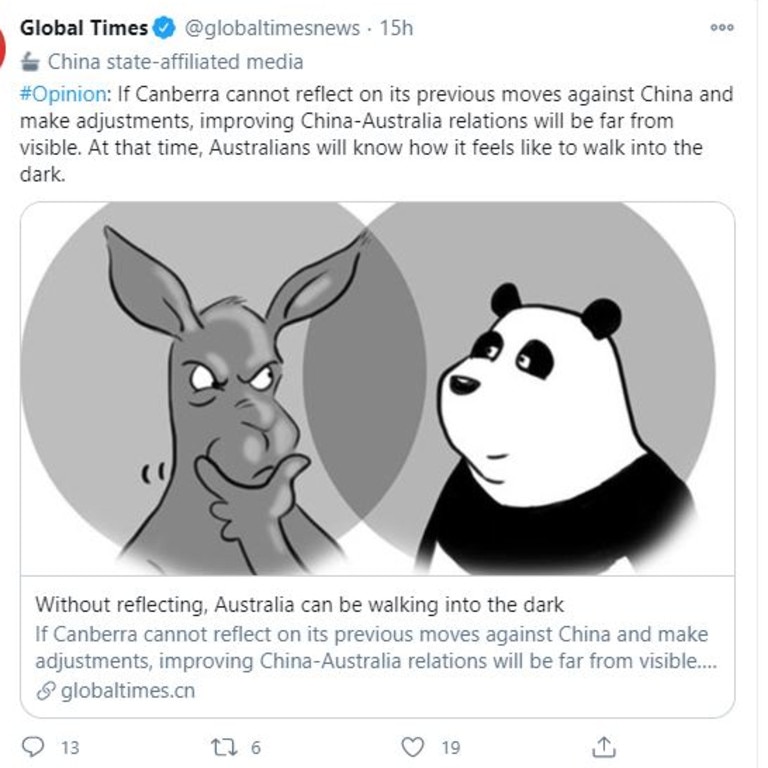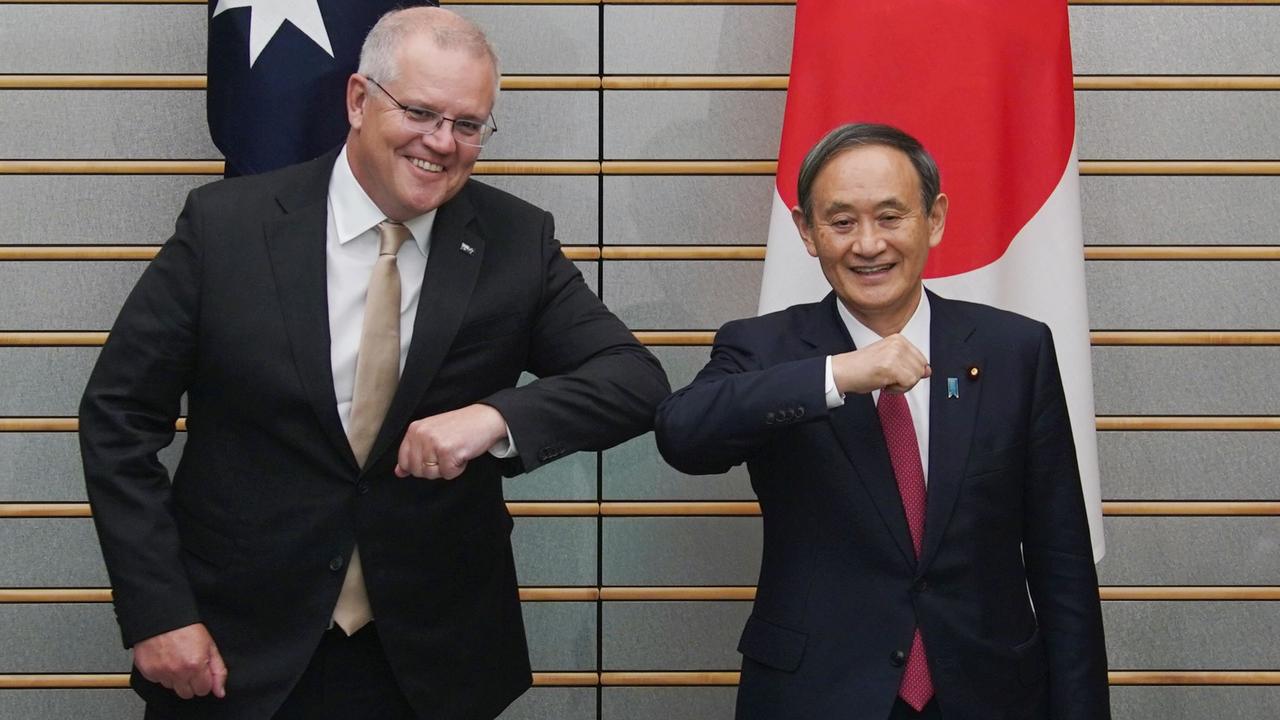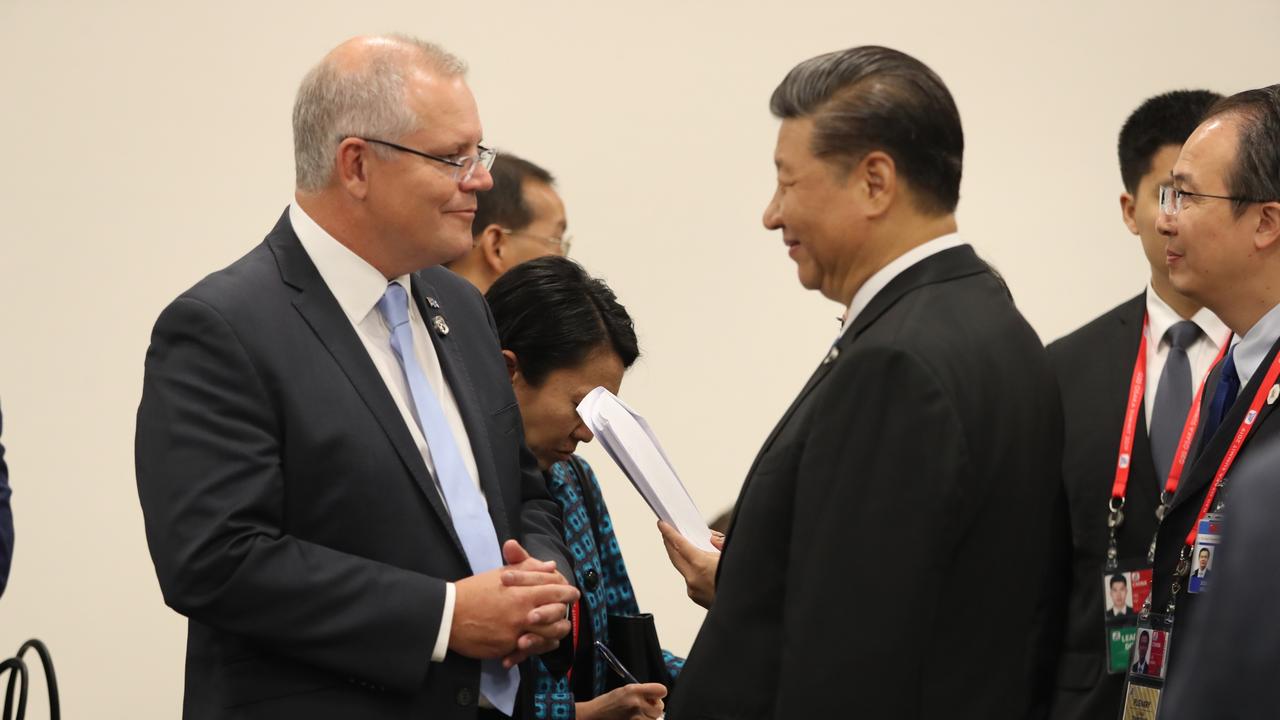Tension with China rises as Xi Jinping talks ‘winning wars’
Chinese leader Xi Jinping is determined to ratchet up the pressure on Australia – and it’s unclear how, exactly, our government should respond.
Tension is the “new normal” for international relations with Beijing. And Chairman Xi Jinping seems determined to ratchet up the pressure.
Xi on Wednesday reportedly “ordered the armed forces to strengthen training under real combat conditions and raise their capability of winning wars”.
Then his state-controlled media openly threatened Australia: “If Canberra cannot reflect on its previous moves against China and make adjustments, improving China-Australia relations will be far from visible. At that time, Australians will know how it feels like to walk into the dark.”
Department of Foreign Affairs and Trade Secretary Frances Adamson on Thursday summarised the precarious situation her diplomats had to contend with.
“China wants to set rather than merely adopt international standards. China wants to lead rather than simply join international institutions,” she said during a lecture to the National Security College.
“China may have reached a point where it believes that it can largely set the terms of its future engagement with the world. If it has, I believe it is mistaken.”
RELATED: America’s brazen move to provoke China

While Beijing’s ire may for the moment be focused on Canberra, its ambitions are far more expansive. There’s the South and East China Seas. There’s Hong Kong and Taiwan. There’s the Himalayas, and the world stage.
Xi this week was urging his military to modernise after his Communist Party commissars “laid out plans to make the People’s Liberation Army (PLA) on par with the US military by 2027”. Xi reportedly “stressed” the need to “enhance technological literacy” among his soldiers, “embrace new technologies” such as artificial intelligence and minimise bureaucracy.
Meanwhile, Communist Party-controlled media and wolf-warrior diplomats are forging ahead with their antagonistic signalling. And they want to make an example of Australia.
“For China-bashers it is imperative to reflect on their words and deeds that have caused a setback in bilateral ties,” the Xinhua news agency declared.
RELATED: China’s major Australia miscalculation

APPEASE OR DISPLEASE?
Chinese state-controlled news service Xinhua accuses Australia of “ideological prejudice”, stating this is “poisoning relations”.
Emeritus Professor of strategic studies at the Australian National University Hugh White agrees.
In an essay published by the Australian Financial Review, Professor White has criticised Canberra’s recalcitrant reaction to Beijing’s demands.
In particular, he targeted Prime Minister Scott Morrison: “He seems to think that Australia can set the terms of the relationship unilaterally”.
“He has found plenty of flag-waving jingoists to encourage him. But now he finds that it is bad politics as well as bad government to trash this most important relationship for short-term applause,” he writes.
RELATED: ‘Ready to fight’: China tensions rise

Professor White did not address the implications of the cultural cleansing of the Uighurs and Tibetans, the assimilation of Hong Kong and Taiwan, nor the territorial ambitions displayed over the Himalayas and South and East China Seas.
And then there’s Beijing’s list of 14 demands of Australia – including restraining the press, academic think-tanks and public political debate. Not to mention cyberattacks, influence operations or technology concerns.
Instead, he writes: “The reality is that international relationships, like any other kind, always require a good deal of accommodation and compromise. Our national interests do not all lie on one side of the issue, and we need to balance competing interests that pull us different ways.”
The question remains, however: Will Beijing offer any accommodation or compromise?
CHANGE IS INEVITABLE
The world has changed. A new diplomatic course must be charted. And there are bleached reefs and artificial islands ahead.
“The moment of a single global superpower has gone,” Adamson told the Australian National University. “Now we have a sharper competition for power, with many more visible and invisible sources of global influence than in previous decades.”
International balances are shifting, be they military, cultural or economic.
And China is making itself noticed.
“Its development has been impressive, and has brought economic benefits beyond its borders to Australia and others,” Adamson said.
But its position in the world requires conciliation and compromise, she says. By all parties.
“The rest of the world has done a lot of thinking about China’s power and what it means. But it is less apparent that China has carefully considered other countries reactions to its conduct internationally,” she said.
RELATED: ‘Chinese’ village that shouldn’t exist

Adamson pointed to the COVID-19 pandemic and climate change as global issues needing global co-operation. But this was being undermined by malicious cyber activity, disinformation and intimidation being directed at open economies and democratic governments.
“Geopolitical tensions have intensified, making multilateral co-operation harder but showing us, forcefully, the need for joint action to resolve complex global challenges, from climate change to persistent humanitarian crises,” she said.
Adamson also tacitly acknowledged the potential for conflict: “Economic success has underpinned strong growth in China’s military spending – delivering a significant boost in the range and sophistication of China’s capabilities for projecting force in its region and beyond.”
AGGRESSIVE STANCE
It’s been a year of speaking dangerously for Chairman Xi.
Last month he told a gathering of politburo officials they must “fight the bloody battle against our enemies”. He also instructed a parade of marine troops to: “focus your minds and energy on preparing to go to war and stay highly vigilant.”
Enlarging and modernising the military featured prominently in the five-year “road map” issued by last month’s Central Committee assembly.
“The road map is in line with China’s overall national strength and the urgent needs of national defence brought by the likes of hegemonies, power politics and regional instabilities in other parts of the world when China is having more development interests overseas,” The Global Times reports.
“As the world has seen a rise in strategic competition, constant armed conflicts and regional warfare, and increasingly obvious instability and uncertainty in security, China as a rising power with huge development interests both at home and abroad requires its military to adapt to new missions,” it quoted military analyst Song Zhongping as saying.
To achieve this, Beijing has issued an ambitious shopping list for advanced weaponry.
“China will develop and produce modern, advanced weapons and equipment in the upcoming five years,” the Global Times reports. Among the new weaponry will be “China’s first long-range, stealth-capable strategic bomber” and an “electromagnetic catapults-equipped aircraft carrier”.
BALANCING ACT
“There is far more to be gained for China, and for everyone else, through working constructively and collaboratively within the international system, without resort to pressure or coercion,” Secretary Adamson said.
Australia’s interests lie in stability and in the character of the enduring peace we seek, reads the 2017 Foreign Policy White Paper. Adamson says this is why any quest for enduring peace won’t be only about China.
“We have to be influential with the United States, too,” she said.
Speaking truth to power is never popular. Be it in the boardroom, party room or diplomatic channels.
“Crafting foreign and strategic policy in an environment such as this starts with clarity about our policy anchors and strategic strengths, and then applying and adapting them to the challenges we face,” she said.
And Australia’s diplomacy isn’t only about economics and influence.
“To be successful we will also need to have credibly fused our interests and values,” Adamson concluded. “The things we stand for at home – such as openness, fairness and a level playing field – will shape our international engagement. It is the character of the international order – not just the way power is distributed – that matters.”
Jamie Seidel is a freelance writer | @JamieSeidel




